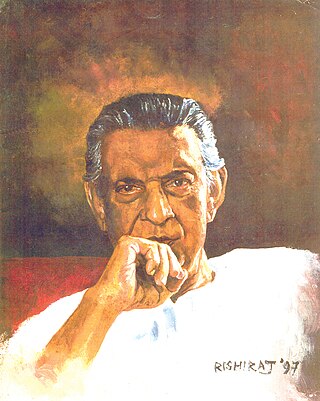Top Qs
Timeline
Chat
Perspective
Satyajit Ray filmography
From Wikipedia, the free encyclopedia
Remove ads
Satyajit Ray (ⓘ; 2 May 1921 – 23 April 1992) was an Indian filmmaker who worked prominently in Bengali cinema and who has often been regarded as one of the greatest and most influential directors in the History of cinema.[1] Ray was born in Calcutta (now Kolkata) to a Bengali family and started his career as a junior visualiser.[2] His meeting with French film director Jean Renoir, who had come to Calcutta in 1949 to shoot his film The River (1951), and his 1950 visit to London, where he saw Vittorio De Sica's Ladri di biciclette (Bicycle Thieves) (1948), inspired Ray to become a film-maker.[3][4] Ray made his directorial debut in 1955 with Pather Panchali and directed 36 films, comprising 29 feature films, five documentaries, and two short films.

Although Ray's work generally received critical acclaim,[5][6] his film Pather Panchali and Ashani Sanket (1973) were criticised for "exporting poverty" and "distorting India's image abroad".[5][7] His Apu Trilogy (1955–1959) appeared in Time's All-Time 100 Movies in 2005.[8] Aside from directing, Ray composed music and wrote screenplays for films, both his own and those by other directors.[9] Often credited as a fiction writer, illustrator, and calligrapher; Ray authored several short stories and novels in Bengali, most of which were aimed at children and adolescents.[10][11] Some of his short stories have been adapted into films by other directors, including his only son, Sandip Ray. Considered a cultural icon in India and acknowledged for his contribution to Indian cinema,[12] Ray has influenced several filmmakers around the world, including Wes Anderson, Martin Scorsese,[13][14] James Ivory,[15] François Truffaut,[16] Carlos Saura,[17] and Christopher Nolan.[18]
Ray intended to make various other films, including The Alien, whose early script is sometimes said to have inspired Steven Spielberg's 1982 film E.T.;[19][20] a documentary on Indian sitar player Ravi Shankar;[21] an adaptation of the ancient Indian epic, the Mahābhārata; and an adaptation of E. M. Forster's 1924 novel, A Passage to India. However, none had been started when he died in 1992.[22]
Ray received numerous awards at international film festivals and elsewhere, including several Indian National Film Awards and an honorary Academy Award at the 64th Academy Awards in 1992.[23] Ray was awarded India's highest award in cinema, the Dadasaheb Phalke Award, in 1984 and India's highest civilian award, Bharat Ratna, in 1992.[24][25]
Remove ads
Key
| † | Indicates a documentary | ‡ | Indicates a short film | § | Indicates a television film/series | # | Indicates an advertisement film |
Filmography
Summarize
Perspective
Remove ads
Contributed to by Ray
Remove ads
See also
Notes
- The title of the film Teen Kanya means three daughters (or girls), however the international version of the film is titled Two Daughters. Though the feature film has three different stories, only two of them were included for the international release—The Postmaster and Samapti[26]
- Unaccredited role[27]
- Based on a short story named Baksho Rahashya by Ray.
- Reused five of Ray's previous compositions from the films; Teen Kanya (1961), Charulata (1964), Shakespeare Wallah (1965), Baksa Badal (1970) and Joi Baba Felunath (1979)[29]
- Based on a novel: Kailashey Kelenkari by Ray.
- Based on a short story named Tintorettor Jishu by Ray.
- Based on a novel: Royal Bengal Rahashya by Ray.
- Based on a novel: Badshahi Angti by Ray.
- Based on two stories: Samaddarer Chabi and Golokdham Rahasya by Ray.
Remove ads
References
External links
Wikiwand - on
Seamless Wikipedia browsing. On steroids.
Remove ads
